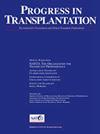在实体器官移植过程中平衡健康与工作的策略
IF 1.1
4区 医学
Q4 SURGERY
引用次数: 0
摘要
导言:接受实体器官移植的工人表示,其健康状况的不可预测性与雇主和医疗服务机构的硬性要求之间经常发生冲突。本研究旨在描述工人在移植前继续工作和移植后可持续重返工作岗位期间所采取的自我管理策略。研究方法从加拿大蒙特利尔的两所大型城市大学医疗中心招募了 15 名受雇的肾移植、肝移植和肺移植受者。举行了三次焦点小组讨论,并进行了主题分析。研究结果:确定了七种策略:及时、持续地应对与疲劳有关的需求;与直接主管提前做好计划,同时对何时披露移植手术保持策略性;要求提供工作便利;要求灵活提供医疗保健服务;就与工作有关的问题咨询医生;告知同事工作限制和免疫抑制;以及要求在工作场所不被区别对待。结论获得工作便利、医生的支持以及灵活的治疗和预约时间安排有助于工人在接受实体器官移植前后保持工作状态的同时管理自己的健康。根据研究结果,医护人员可能需要解决工人对工作限制和工作便利实施的担忧,尤其是在移植前和移植后病假期间疾病管理负担加重的情况下。未来的研究可以描述其他重要利益相关者在试图为工人提供支持时所采用的策略。本文章由计算机程序翻译,如有差异,请以英文原文为准。
The Strategies Used to Balance Health and Work Across the Solid Organ Transplantation Trajectory
Introduction: Workers who undergo solid organ transplantation report frequent conflicts between the unpredictable demands of their health condition and the rigid requirements of their employer and of health services. The present study aimed to describe the self-management strategies adopted by workers while staying at work before transplantation and during sustainable return-to-work posttransplantation. Methods: Fifteen employed kidney, liver, and lung transplant recipients were recruited from 2 large urban university health centers in Montreal, Canada. Three focus groups were held, and thematic analysis was performed. Findings: Seven strategies were identified: responding promptly and consistently to fatigue-related needs, planning ahead with immediate supervisors while remaining strategic about when to disclose transplantation, requesting work accommodations, requesting flexibility in healthcare provision, consulting physicians about work-related issues, informing co-workers about work limitations and immunosuppression and asking not to be treated differently in the workplace. Conclusion: Access to work accommodations, support from physicians and flexibility in treatment and appointment schedules supported workers’ ability to manage their health while staying at work before and after undergoing solid organ transplantation. In light of findings, it may be useful for healthcare professionals to address workers’ concerns about work limitations and work accommodation implementation, especially when the illness-management burden increases before transplantation and during posttransplantation sick leave. Future studies could describe the strategies used by other important stakeholders when attempting to provide support to workers.
求助全文
通过发布文献求助,成功后即可免费获取论文全文。
去求助
来源期刊

Progress in Transplantation
SURGERY-TRANSPLANTATION
CiteScore
1.50
自引率
12.50%
发文量
44
审稿时长
6-12 weeks
期刊介绍:
Progress in Transplantation (PIT) is the official journal of NATCO, The Organization for Transplant Professionals. Journal Partners include: Australasian Transplant Coordinators Association and Society for Transplant Social Workers. PIT reflects the multi-disciplinary team approach to procurement and clinical aspects of organ and tissue transplantation by providing a professional forum for exchange of the continually changing body of knowledge in transplantation.
 求助内容:
求助内容: 应助结果提醒方式:
应助结果提醒方式:


